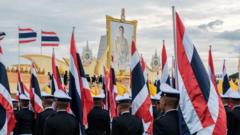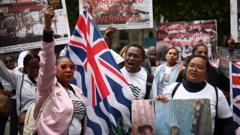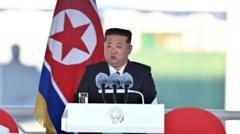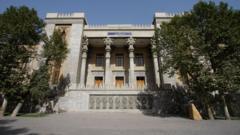Paul Chambers, an American academic in Thailand, is subject to an arrest warrant under the country's lese-majeste law after complaints from the military. The case raises concerns about freedom of expression and the use of this controversial law against foreigners.
Arrest Warrant Issued for American Academic Under Thailand's Controversial Lese-Majeste Laws

Arrest Warrant Issued for American Academic Under Thailand's Controversial Lese-Majeste Laws
A lecturer faces serious charges under Thailand's lese-majeste laws following allegations of insulting the monarchy, sparking debates on free speech and political prosecution.
A Thai court has issued an arrest warrant for Paul Chambers, an American lecturer at Naresuan University, based on allegations of violating the country's lese-majeste law, which prohibits insults to the monarchy. The military filed a formal complaint against him, claiming he engaged in "defamation, contempt or malice" towards the royal family, alongside charges of importing damaging computer data likely to harm national security.
Chambers is expected to report with his lawyer to the police, where charges are set to be officially presented. If found guilty, Chambers could face a prison sentence ranging from three to 15 years for each count of lese-majeste. Legal representatives have expressed confusion over the specific motivations behind the complaint filed by the army.
Although applying the lese-majeste law against foreigners is relatively uncommon, legal experts confirm that it has occurred in the past. In this case, the army's allegations also involve the dissemination of computer data that potentially threatens national security, which has heightened the stakes for Chambers.
His legal team plans to apply for bail should he be detained following the filing of charges. This incident comes amid heightened scrutiny of Thailand's lese-majeste law, which has faced criticism for stifling free speech, particularly following a wave of student-led pro-democracy protests that began in 2020. Since then, the Thai Lawyers for Human Rights Centre has documented over 300 cases involving more than 270 people who have faced prosecution under this law.
Critics argue the law is misused to suppress dissent and reformist ideas, especially in the wake of political movements aiming to challenge the monarchy's influence. Last year, a political party advocating reforms to the lese-majeste law was dissolved by a court ruling for unconstitutional conduct. As discussions around potential amendments to the law arise, global entities, including the European Parliament, have urged Thailand to amend its strict legal framework and consider amnesty for those prosecuted under it.
As Thai parliament reconvenes to deliberate on amnesty bills, the national and international communities are closely watching developments relating to freedom of expression and human rights in Thailand.





















